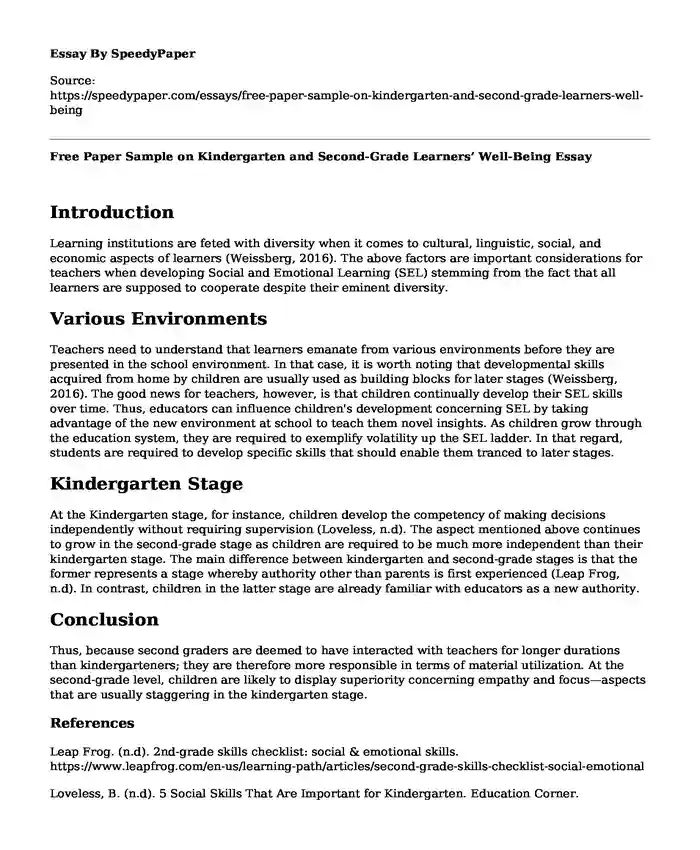Introduction
Learning institutions are feted with diversity when it comes to cultural, linguistic, social, and economic aspects of learners (Weissberg, 2016). The above factors are important considerations for teachers when developing Social and Emotional Learning (SEL) stemming from the fact that all learners are supposed to cooperate despite their eminent diversity.
Various Environments
Teachers need to understand that learners emanate from various environments before they are presented in the school environment. In that case, it is worth noting that developmental skills acquired from home by children are usually used as building blocks for later stages (Weissberg, 2016). The good news for teachers, however, is that children continually develop their SEL skills over time. Thus, educators can influence children's development concerning SEL by taking advantage of the new environment at school to teach them novel insights. As children grow through the education system, they are required to exemplify volatility up the SEL ladder. In that regard, students are required to develop specific skills that should enable them tranced to later stages.
Kindergarten Stage
At the Kindergarten stage, for instance, children develop the competency of making decisions independently without requiring supervision (Loveless, n.d). The aspect mentioned above continues to grow in the second-grade stage as children are required to be much more independent than their kindergarten stage. The main difference between kindergarten and second-grade stages is that the former represents a stage whereby authority other than parents is first experienced (Leap Frog, n.d). In contrast, children in the latter stage are already familiar with educators as a new authority.
Conclusion
Thus, because second graders are deemed to have interacted with teachers for longer durations than kindergarteners; they are therefore more responsible in terms of material utilization. At the second-grade level, children are likely to display superiority concerning empathy and focus—aspects that are usually staggering in the kindergarten stage.
References
Leap Frog. (n.d). 2nd-grade skills checklist: social & emotional skills.
https://www.leapfrog.com/en-us/learning-path/articles/second-grade-skills-checklist-social-emotional
Loveless, B. (n.d). 5 Social Skills That Are Important for Kindergarten. Education Corner. https://www.educationcorner.com/social-skills-for-kindergarten.html
Weissberg, R. (2016, February 15). Why Social and Emotional Learning Is Essential for Students. Edutopia. https://www.edutopia.org/blog/why-sel-essential-for-students-weissberg-durlak-domitrovich-gullotta
Cite this page
Free Paper Sample on Kindergarten and Second-Grade Learners' Well-Being. (2023, Nov 06). Retrieved from https://speedypaper.com/essays/free-paper-sample-on-kindergarten-and-second-grade-learners-well-being
Request Removal
If you are the original author of this essay and no longer wish to have it published on the SpeedyPaper website, please click below to request its removal:
- Essay Sample: Texas College Admission
- Essay Example on Epistemological Research
- Letter of Purpose, Free Example
- Entrepreneurship and Innovation - Application Essay Example
- Nursing Informatics Essay Example
- Essay Example: Advocacy Through Legislation
- What Are the Factors Affecting UAe Citizens' Food Literacy? Paper Example
Popular categories





